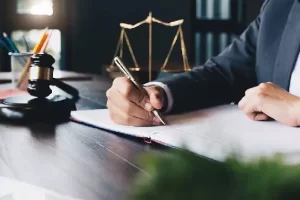Being a lawyer implies a high level of responsibility and dedication. Lawyers have to be constantly informed of legislative developments, judicial matters, the needs of their clients and the demands of the courts. Despite this, no one is exempt from making mistakes and sometimes errors can occur that can damage image, credibility and professional performance. That is why we will tell you what the 10 most common mistakes that lawyers make are and how to avoid them.
Most common mistakes lawyers make and how to avoid them
1 – Not communicating properly with customers
Communication is key to establishing a good relationship with clients and understanding their needs, expectations and objectives. A lawyer must regularly inform the client about the status of their case, available options, risks and possible solutions. You must also actively listen to the client, resolve their doubts and respond to their suggestions. To avoid this error, it is recommended to use various communication channels (phone, email, video conference), set deadlines and appointments in advance, confirm receipt of messages and document agreements and decisions in writing.
2 – Not managing time well
Time is a limited and valuable resource for lawyers, who often have multiple tasks and commitments to attend to. Poor time management can cause delays, stress, loss of quality and customer discontent. To avoid this mistake, it is recommended to plan activities with priority, delegate those that you can, use technological tools that facilitate organization and time control, establish safety margins and learn to say no when necessary.
Delegation is a skill that allows you to optimize work and take advantage of the team’s talent. A lawyer who does not adequately delegate tasks may become overloaded with work, neglect important aspects of the case, or generate conflicts with his collaborators.
3 – Not investigating the case enough
Investigation is essential to prepare a case with solvency and rigor. A lawyer must gather all relevant information about the facts, evidence, legislation, jurisprudence and doctrine applicable to the case. An investigation deficit can lead to weak argumentation, a lack of evidentiary support or a violation of procedural rules. To avoid this error, it is recommended to dedicate the necessary time to research, consult various sources of information (official, academic, professionals, etc.), compare the data obtained and update it periodically.
4- Not writing legal documents well
Legal documents are the means by which lawyers express their claims, defenses and arguments before the parties and judicial or administrative bodies. Poor drafting can generate confusion, ambiguity, contradiction or inadmissibility of documents. To avoid this error, it is recommended to follow legal style rules, use clear, precise and coherent language, properly structure documents, check spelling and grammar and adapt the content to the recipient and the purpose of the document.
5- Not being up to date with legal news
Law is a dynamic and changing science that requires constant updating by lawyers. Laws, regulations, rulings and doctrinal opinions may vary or be modified at any time and affect ongoing or future cases. Ignorance of legal developments may lead to a loss of opportunities, a violation of rights or professional liability. To avoid this error, it is recommended to subscribe to official bulletins, legal journals, specialized blogs or professional social networks that inform about legal news.
6 – Not taking care of your professional image
Professional image is a key factor for a lawyer’s success. It is about the way in which the lawyer presents himself to others, both personally, socially and digitally. The professional image conveys the identity, credibility and trustworthiness of the lawyer, and can influence the perception of clients, colleagues and judges. Therefore, a lawyer who neglects his professional image can put his reputation, his client portfolio and his prestige at risk. Lawyers must take care of their professional image with attention and consistency, adapting it to each situation and context.
7 – Not taking care of your physical and mental health
Physical and mental health is a determining factor for the well-being and performance of the lawyer. A lawyer who does not take care of his physical and mental health may suffer from illness, exhaustion or depression. Lawyers should adopt healthy habits such as eating well, exercising, getting enough sleep, relaxing, and having fun.
8 – Not cultivating your personal and professional relationships
Personal and professional relationships are a source of support, learning and growth for the lawyer. A lawyer who does not cultivate his personal and professional relationships can isolate himself, lose contacts or generate conflicts. Lawyers must maintain a network of positive relationships with their family, friends, colleagues, clients and other actors in the legal field.
9- Lying to the client
This aspect comes hand in hand with the other factors, since a lawyer with little experience can lie to the client just to get hired, however, that is why it is essential to evaluate the lawyer’s professionalism, investigate references and previous cases. to avoid being deceived.
10 – Not developing your vocation and passion for law
The vocation and passion for law are the driving forces that drive the lawyer to practice his profession with excellence, ethics and commitment. A lawyer who does not develop his vocation and passion for law may lose the meaning, motivation or satisfaction of his work. Lawyers must remember why they chose to be lawyers, what they like and what makes them happy about their profession.

How to choose the best lawyers for your case?
Choosing a good lawyer is a crucial decision when facing a legal matter, whether immigration, defense or consultation. Not all lawyers have the same level of training, experience, specialization or prestige. Therefore, we offer you some guidelines so that you can select the most appropriate professional for your situation, which will represent and guide you.
Identify the type of case you have and the area of law that regulates it
A criminal case is not the same as a civil, labor, administrative, immigration or family case. Each of these areas has its own rules, procedures and courts. Therefore, you need a lawyer who specializes in the issue that affects you and who is well versed in the legislation and jurisprudence in this regard.
Find references and opinions about the lawyer you are interested in
One way to find a good lawyer for your case is to ask for recommendations from people you trust who have been through a situation similar to yours and who have been happy with the result. Another option is to search the internet, on websites, social networks or specialized directories, where you can see the credentials, qualifications and opinions of other clients about the available lawyers.
Compare several lawyers before deciding on one
Don’t settle for the first one you see or the one that offers you the lowest price. We recommend that you request several free quotes or consultations to have the opportunity to meet potential candidates in person.
Set the conditions of the contract with the lawyers you choose
To avoid misunderstandings or conflicts, it is important that both the lawyer and the client agree on the terms of the legal service. These terms include the amount and method of payment, additional costs that may arise, the estimated time of the process, the responsibilities and benefits of each party. These aspects must be stated in writing in a contract that is signed by both parties.
By following these steps you will be able to choose the best lawyer for your case and have a better chance of obtaining a favorable result. Remember that choosing a good lawyer is an investment in your future and your peace of mind.



